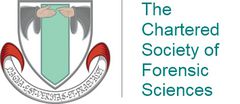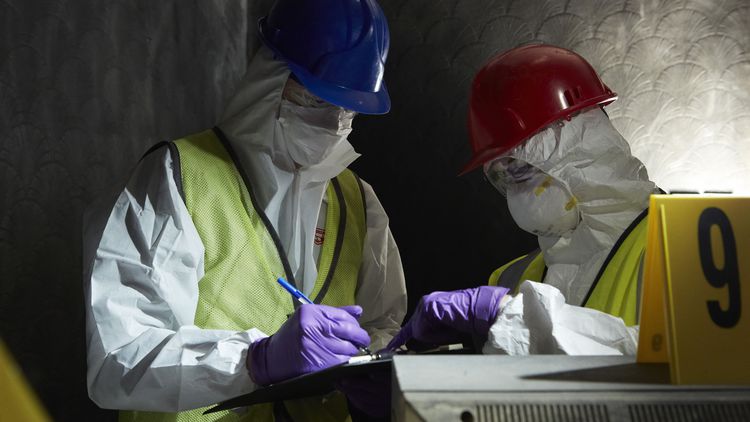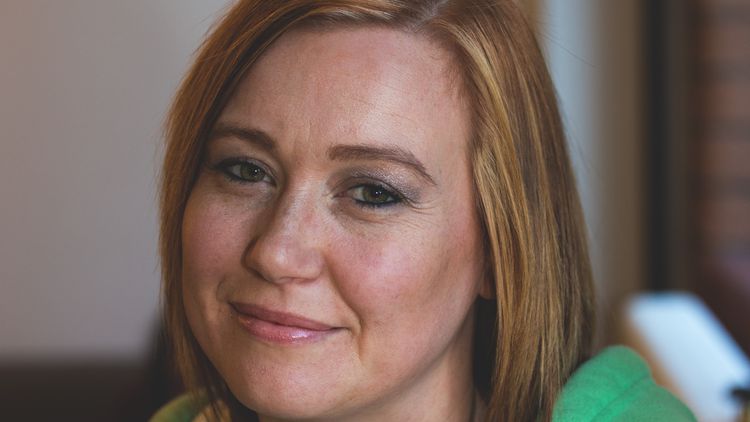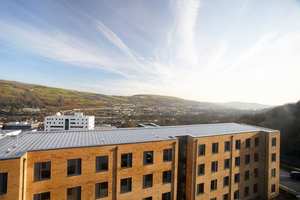
BSc (Hons) Forensic Investigation
Our Forensic Investigation degree allows students without a traditional science background, or those with a specific interest in this field, to acquire knowledge relating to the use of forensic techniques in a wide range of criminal investigations.
Investigations could include sport and competition drugs testing, consumer protection and authenticity, DNA analysis in food testing, wildlife crime, and toxicological investigations linked to chemical and biological terrorism.
You’ll gain practical skills in volume crime scene examination, analysis of forensic evidence, and courtroom simulations. The Forensic Investigation degree will also teach you about the structure and processes that regulate the criminal justice system, and the law associated with criminal investigation.
You’ll undertake simulated investigations in our multi-room Crime Scene Training Facility, ranging from domestic burglaries and vehicle examinations to more complex scenes such as arson and homicide. You’ll study several cases and learn about the forensic techniques used to solve the crime, and be able to critically appraise and evaluate forensic approaches.
You will study a diverse range of subject areas relevant to forensic investigation, including crime scene investigation, collection and analysis of evidence, the structure and processes which regulate the criminal justice system and laws associated with criminal investigation.
Year One: Forensic Investigation Degree
During the first year, you will receive an introduction to the various disciplines within the forensic science field and this will be complimented with practical experience gained through the examination of realistic simulated crime scenes from domestic burglaries to homicide within our suite of forensic laboratories and bespoke crime scene house. Other subject areas such as Policing, Health and Safety, Introductory Science and Mathematics will also be studied. Modules include:
- Introduction to Forensic Analysis
This module introduces students to the fundamental aspects of evidence processing techniques through a combination of laboratory-based training exercises and theory-based learning. Students will develop an appreciation of a range of laboratory techniques applied to trace particulates and biological evidence materials, including, search, recovery, creating professional contemporaneous case notes to contribute to the laboratory case file, basic microscopy, and chemical testing for the presence of biological materials. - Introduction to Crime Scene Investigation
The practice of forensic science requires an understanding of a broad range of forensic topics and involves many investigative techniques. This module will provide you with the knowledge, practical understanding and technical ability relating to the investigation of crime. Here you will study introduction to crime scene investigation; documentation; collection and preservation of physical evidence; interpretation of crime scene evidence and crime scene reconstruction. - Law, Governance and the Criminal Justice System
This module will introduce you to the legislative and criminal justice system of England and Wales. This will include identifying the role of the police and associated agencies, who work in this environment. You will also examine the role of governance within the policing and security environments.
- Fundamental Scientific Principles for Forensic Investigation
Within this module you will be introduced to the concepts of scientific investigation, measurement, accuracy and essential chemical and biological theories and practices involved in forensic investigation. This will include assisting you to develop good laboratory technique within these areas, but also an introduction to chemistry, cell and molecular biology, serology, genetics and DNA. -
Introduction to Criminology and Crime Analysis
In this module you will learn about the scientific and statistical tools used to evaluate crime along with its origin and context, prevalence, and effects upon victims and society. You will be given an overview of the classification of criminal offences and links to intelligence and evidence. - Key Skills for Forensic Investigation*
This module will provide you with an appreciation of the principles of safe working in laboratories, accident prevention and the promotion of safety in the workplace and the consequences for health due to exposure to hazards. You will develop an understanding of the information concerning hazards in performing experimental work and in the calculation of the probability of an accident and to estimate risk. Additionally the use of IT for scientific working, accessing journals and referencing skills are provided.
*25% of this module can be studied in Welsh.
Year Two: Forensic Investigation Degree
During the second year of study, you will further enhance your skills through the analysis of evidence in the laboratory, learning about the various chemical and biological analyses that are used within forensic laboratories. Specialist disciplines such as photography, Forensic Earth Science, Computer Forensics and microscopy are introduced here. Modules studied include:
- Analysis and Interpretation of Evidence
To extend the student’s practical capabilities and knowledge pertaining to particulate and biological trace evidence analysis with a particular focus on the use of sector-standard instrumentation, quality control processes and sector-standard documentation. To introduce students to the interpretation and presentation of scientific data generated from analytical techniques. - Volume Scene Examination
Within this module you will gain practical digital imaging, crime scene photography and video experience recording a variety of crime scenes scenarios. This will involve studying the theoretical aspects of photography, and equipment: Films and film speeds, camera formats, focal length, aperture and depth of field, lighting techniques and flash. In addition to this, you will gain practical training in core skills for the crime scene investigator within a series of simulated volume crime scenes including vehicle examination. - Forensic Examination of Human Remains
To introduce students to the strategic and unique aspects involved in the analysis of human remains. To provide a detailed description of scientific and technological methods used in the investigation of victims of crime or natural disasters. - Digital Forensics (e-crime)
You will develop knowledge and evaluate the tools and techniques associated with the creation and delivery of a computer forensic service within a team environment. You will learn to demonstrate knowledge and skill in the processes required to manage a forensic project, from initial seizure to presenting evidence in the courtroom. - Forensic Psychology and Investigative Strategies
In this module you will gain an understanding of the reactive and proactive approaches to criminal investigations. You will understand the complex nature of offender motivation and consequences for the crime scene. The module will also include an introduction to the complex field of forensic psychology and its role and uses in the criminal investigation procedure. - Science in Practice for Forensic Investigation
You will learn about the prevalence, abuse and effects and forensic examination of drugs and alcohol. This will include the sports doping, hair analysis and in the investigation of consumer products. In addition to this, you will gain an appreciation of the role of earth science data in the forensic examination of crime scenes or reported episodes.
Year Three: Forensic Investigation Degree
You will be introduced to more complex Forensic Investigation areas such as Fire and Explosion and Specialist areas of Forensic Investigation. Emphasis will still be placed on the Policing strand of the course and the importance of crime scene processing, and evidence handling in the laboratory. You will also undertake an independent literature review research project. Modules studied include:
- Research Project and Employability Skills
This will involve the scientific evaluation of cases and evidence and statistical evaluation of forensic evidence and professional ethics and standards. Cases will include forensic pathology, homicide, suicide and accidental death amongst others. In addition to this, you will be introduced to the court room processes and the role of the expert witness, barristers, cross-examination and evidence in chief. As part of this module, you will conduct a literature review which will involve a critical evaluation of primary information and data on a selected topic within forensic science. - Forensic Casework and the Expert Witness
To allow the development and application of teamwork, critical thinking and forensic skills through the experimental design and processing of a simulated forensic case with particular attention to DNA, paint and glass evidence, QA and the interpretation of analytical data using statistical methods. To allow the student to consolidate and advance their understanding of the regulations applying to forensic practitioners when analysing, interpreting and presenting evidence and to develop knowledge and skills to be able to provide witness testimony. - Road Traffic Policing and Vehicle Investigation
To receive theoretical and practical instruction in traffic incident examination and interpretation, including GIS technology, speed calculations and vehicle penetration profiles. To critically analyse complex road policing legislation. - Specialist Subjects in Criminology
To provide students with a detailed knowledge and critical understanding of a wide range of specialist and serious offences including the study of their origins, offender motivation, traceability including a focus on evidence, and the associated legal frameworks and penalties. To provide students with an opportunity to appreciate serious and organised crime at a national, regional, and global level. - Specialist Evidence and its Investigation
Within this module you will be provided with an understanding of a variety of specialist investigation fields including wildlife forensics, forensic engineering and the investigation of biological and radiological hazards. In addition to this, you will learn about bioterrorism and its’ investigation and wildlife forensics. - Major Scene Examination
This module aims to allow you to develop a detailed knowledge of the forensic criminal investigation process and gain a critical understanding applied to a range of specialist and serious offences described as major incident investigations. You will apply associated learning through exposure to relevant and related simulated major scene scenarios and case studies.
This downloadable guide allows you to compare modules across all our Forensic courses.
Teaching
The Forensic Investigation course will be delivered through a series of lectures, tutorials and practical classes. In addition to this, students are expected to undertake both directed and independent learning, reading around the subject area.
On an average week, students may be expected to attend the following:
- Six lectures
- Three to four hours of tutorials or workshops
- Up to 10-12 hours of practical work
- Independent directed study
The timetable may be spread over all five days of the taught week (Monday to Friday inclusive) or it may for example, allow students half a day or a full day free from contact classes. This is subject to change on a weekly basis depending upon when individual activities for modules are timetabled.
Guest lecturers are invited to speak to students on a range of topics. Previous topics have included fire investigation, ballistics cases and identification of bodies from mass graves.
Assessment
Students will be assessed by various means, including written examinations, in class tests, essays, reports, practical exercises, presentations, assessed tutorials and computer assignments. Some modules will be continually assessed and others may have an end of year examination.
Accreditations
Accredited by the Chartered Society of Forensic Sciences.
Facilities
Our laboratories are of a standard you would expect to find in industry. If you choose to study Forensic Investigation, you will make full use of the George Knox laboratories and gain hands-on experience using extensive analytical equipment. This will allow you to develop a portfolio of highly desirable practical skills that you can add to your CV. In particular, when using the more specialised equipment and facilities, you will find yourself working in groups of up to just four or five students.
Our laboratory facilities include a dedicated organic chemistry laboratory; a combined inorganic/physical chemistry laboratory; two large general instrument laboratories that house analytical instruments such as UV/visible spectrometers, infrared spectrometers, fluorescence spectrometers, optical emission spectrometers, and gas and liquid chromatographs; a dedicated student research laboratory and two specialist laboratories for performing nuclear magnetic resonance (NMR) spectrometry and scanning electron microscopy In addition, students have access to the laboratories and instrumentation in the University’s Sustainable Environment Research Centre (SERC) which include ultra-high performance liquid chromatograph tandem mass spectrometers, ion chromatographs and headspace gas chromatographs. View our Forensic Science facilities.
Lecturers
You will be taught by staff in our analytical and forensic science team which consist of specialist forensic science practitioners, experts in DNA analysis and bloodstain pattern analysis, experts in forensic toxicology, crime scene investigators and chartered chemists.
- Hannah Minton, course leader
- Mark Boulter
- Helen Higgins
- Dr Paul Jones
- Dr Sorcha Diskin
- Dr Gareth Powell
- Peter Eden
- Sharan Johnstone
- Huw Smart
- Allison Turner
- James A Cruwys
- Richard Law
- Andrew Bellamy
- Tracie McKinney
- Natasha Galea
- Peter Miedziak
- Dr Jaime Massanet-Nicolau
- Dr Meirion Pugh
- Dr Sheri Murrell
- Cara Latcham
- Emma Derbi
- Zella Parry
- Mia Lambert
- Katie Bird
- Alexandra Maneta
- Michael Morse
- Suzanna Kean
We also employ several specialists within the forensic field to deliver training on this course to enhance your study.
We regularly revalidate courses for quality assurance and enhancement
At USW, we regularly review our courses in response to changing patterns of employment and skills demand to ensure we offer learning designed to reflect today’s student needs and tomorrow’s employer demands.
If during a review process course content is significantly changed, we’ll write to inform you and talk you through the changes for the coming year. But whatever the outcome, we aim to equip our students with the skillset and the mindset to succeed whatever tomorrow may bring. Your future, future-proofed.
Contextual offers
We may make you a lower offer based on a range of factors, including your background (where you live and the school or college that you attended for example), your experiences and individual circumstances (as a care leaver, for example). This is referred to as a contextual offer and we receive data from UCAS to support us in making these decisions. USW prides itself on its student experience and we support our students to achieve their goals and become a successful graduate. This approach helps us to support students who have the potential to succeed and who may have faced barriers that make it more difficult to access university. Here is a link to our Contextual Admissions Policy.
Other qualifications and experience
We can also consider combinations of qualifications and other qualifications not listed here may also be acceptable. We can sometimes consider credits achieved at other universities and your work/life experience through an assessment of prior learning. This may be for year one entry, or advanced entry to year two or three of a course where this is possible.
To find out which qualifications have tariff points, please refer to the UCAS tariff calculator.
If you need more help or information or would like to speak to our friendly admissions team, please contact us here
Please note that whilst this course does not require a DBS Check for entry, some professions will not consider candidates who have certain types of criminal convictions.
Therefore, if you have a criminal conviction and you are considering a particular career path we would recommend that you check with the relevant professional body or refer to their recruitment policy to make sure that your conviction will not disadvantage you.
Typical A-Level Offer
BCC (this is equivalent to 104 UCAS tariff points).
Typical Welsh BACC Offer
Pass the Advanced Welsh Baccalaureate Diploma with Grade C in the Skills Challenge Certificate and BC at A Level (this is equivalent to 104 UCAS tariff points).
Typical BTEC Offer
BTEC Extended Diploma Distinction Merit Merit (this is equivalent to 112 UCAS tariff points).
Typical Access to HE Offer
Pass the Access to HE Diploma and obtain a minimum of 104 UCAS tariff points
Additional Requirements
GCSEs: The University normally requires a minimum 5 GCSEs including Mathematics/Numeracy and English at Grade C or Grade 4 or above, or their equivalent, but consideration is given to individual circumstances.
International Entry Requirements
We also welcome international applications with equivalent qualifications. Please visit the country specific pages on our international website for exact details.
English Requirements
In general, international applicants will need to have achieved an overall IELTS grade of 6.0 with a minimum score of 5.5 in each component.
However, if you have previously studied through the medium of English IELTS might not be required, but please visit the country specific page on our international website for exact details. If your country is not featured please contact us.
Full-time fees are per year. Part-time fees are per 20 credits. Once enrolled, the fee will remain at the same rate throughout the duration of your study on this course
August 2024 - July 2025 Fees
Full-time UK: £9000
Full-time International: £15260
August 2025 - July 2026 Fees
Full-time UK: TBC
Full-time International: TBC
Student Perks
At the University of South Wales, you’re investing in so much more than a degree. We strive to provide our students with the best possible experience, no matter what you chose to study. Whether it’s access to top of the range mac books and PCs, state-of-the-art facilities packed with industry-leading equipment and software, masterclasses and events led by industry experts, or a wide range of clubs and societies to meet likeminded people, better tomorrows start with extra perks.
Each course also has their own unique student benefits to prepare you for the real word, and details of these can be found on our course pages. From global field trips, integrated work experience and free course-related resources, to funded initiatives, projects working with real employers, and opportunities for extra qualifications and accreditations - at USW your future, is future-proofed.
Click here to learn more about student perks at USW.
Additional Costs
As a student of USW, you’ll have access to lots of free resources to support your study and learning, such as textbooks, publications, online journals, laptops, and plenty of remote-access resources. Whilst in most cases these resources are more than sufficient in supporting you with completing your course, additional costs, both obligatory and optional, may be required or requested for the likes of travel, memberships, experience days, stationery, printing, or equipment.
* Obligatory
| Item | Cost | |
|---|---|---|
| Kit / Equipment | Students are encouraged to equip themselves with a suitable cotton laboratory coat, suitable for working in a chemical laboratory, and a pair of personal protective laboratory goggles, although the School does provide these items.
Students who are successful in securing an industry-based project may, in a small number of cases, be required to purchase additional personal protective equipment as specified by the specific organisation or company.
|
|
| Placement * | Students who successfully secure a placement in industry to complete their major research project would be expected to pay their own travel costs to and from the venue during the period of placement. The cost of this will of course vary and some students have also paid for accommodation close to their place of work for the duration of their placement. |
Funding
Funding to help pay for (or cover) course tuition fees and living costs
Whilst you’re studying, you’ll have two main financial obligations – tuition fees and living costs. There’s lots of financial help available from the University of South Wales and external funding sources, that may provide loans (which have to be paid back) and grants, scholarships and bursaries (that don't).
To learn about course fees, funding options, and to see if you are eligible for financial support, visit our Fees and Funding pages.
Faculty of Computing, Engineering and Science Travel Bursary
The Faculty of Computing, Engineering and Science offers a travel bursary of £500 which is available to all students undertaking an undergraduate sandwich degree. Find out more.
UK students
Apply via UCAS if you are a UK residing applicant, applying for year one of a full-time undergraduate degree, Foundation Year, Foundation Degree or HND and you have not applied through UCAS before. If you are applying to study part-time, to top up your Foundation Degree or HND, or to transfer to USW from another institution, please apply directly.
International and EU students
Apply directly to the University if you live outside the UK.
The BSc Forensic Investigation degree will help you develop the academic, vocational and personal skills needed to pursue a variety of careers. These include roles in crime scene and forensic investigation units, and in the wider criminal justice sector. The course is designed to also develop transferrable skills that you can apply to a range of occupations requiring a scientific analytical background.
Our Careers and Employability Service
As a USW student, you will have access to advice from the Careers and Employability Service throughout your studies and after you graduate.
This includes: one-to-one appointments from faculty based Career Advisers, in person, over the phone or even on Skype and through email via the "Ask a Question" service. We also have extensive online resources for help with considering your career options and presenting yourself well to employers. Resources include psychometric tests, career assessments, a CV builder, interview simulator and application help. Our employer database has over 2,000 registered employers targeting USW students, you can receive weekly email alerts for jobs.
Our Careers service has dedicated teams: A central work experience team to help you find relevant placements; an employability development team which includes an employability programme called Grad Edge; and an Enterprise team focused on new business ideas and entrepreneurship.






